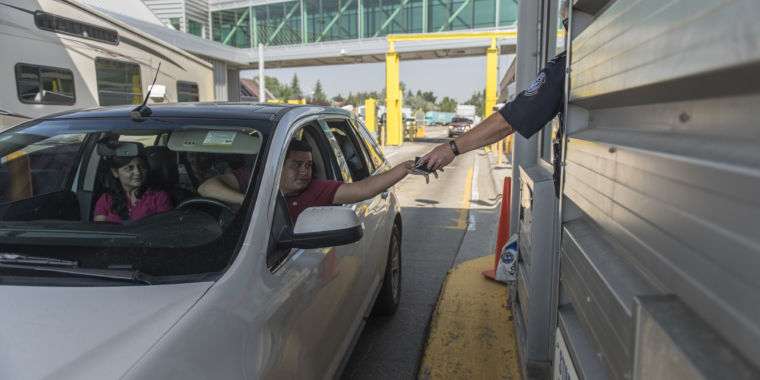
/ Vehicles entering the United States from Canada on the Customs and Border Safety Sweetgrass border crossing on Interstate 15 in Sweetgrass, Montana.
ProPublica on November 22, 2017. It has been evenly edited.
The Division of Immigration & Customs Enforcement is taking new steps in its plans for monitoring the social media accounts of applicants and holders of US visas. At a tech industry conference closing Thursday in Arlington, Virginia, ICE officials defined to software companies what they are seeking: algorithms that can assess doable threats posed by visa holders in the US and conduct ongoing social media surveillance of those deemed high risk.
The comments provide the principle clear blueprint for ICE’s proposed augmentation of its visa-vetting program. The initial announcement of the plans this summer, considered as fraction of President Donald Trump’s requires the “excessive vetting” of company from Muslim countries, stoked a public outcry from immigrants and civil liberties advocates. They argued that such a idea would discriminate towards Muslim company and per chance region a huge number of folks beneath watch.
ICE officials therefore changed this system’s name to “Visa Lifecycle Vetting.” But, according to the ICE presentation, the aim of the initiative—enhanced monitoring of visa holders the exercise of social media—remains the same.
Talking to a room of recordsdata-expertise contractors, hosted by the Authorities Technology & Services Coalition, Louis Rodi, deputy assistant director of ICE Save of delivery Security Investigations’ National Security Program, talked about the agency desires a software outfitted with “risk-basically based solely matrices” to foretell dangers posed by visa holders, with the social media of those thought a couple of threat beneath trusty surveillance all the arrangement thru their preserve in the US.
“Now we have thousands and thousands and thousands and thousands and thousands and thousands of folks coming yearly and therefore departing, so we ought to unruffled be orderly about it,” talked about Rodi to a room of representatives from firms like Microsoft, Accenture, Deloitte, and Motorola Solutions. “And I’m distinct there are tools available that could well help.”
For this centered neighborhood of visa holders, ICE’s online monitoring of public social media posts could well be gargantuan-scale and non-end. “The entire lot we’re coping with is in bulk, so we wish batch-vetting capabilities for any of the processes that we’ve,” talked about Rodi. Alysa Erichs, ICE Save of delivery Security Investigations’ appearing deputy affiliation director for recordsdata management, urged attendees that ICE hopes to earn computerized notifications about any visa holders’ social media exercise that could well “ping us as a doable alert.”
ICE spokeswoman Carissa Cutrell confused to ProPublica that the Division of Save of delivery Security has no longer truly begun constructing one of these program. “The quiz for recordsdata on this initiative used to be simply that—a possibility to accumulate recordsdata from industry mavens and assorted govt companies on recent technological capabilities to search out out the most sensible likely methodology forward,” Cutrell wrote in an email. The program would require clearance from diverse DHS items, at the side of the Privateness Office and the Valuable Factual Handbook, old to it could well in all probability in all probability well be performed, according to a federal honorable who spoke on the placement of anonymity.
In his speech, Rodi referred to meetings ICE has had with firms but did no longer mention any frontrunners. The most fundamental tech firms recent on the conference, at the side of Microsoft, Accenture, and Deloitte, either declined to comment or didn’t answer to ProPublica’s quiz to comment about their degree of passion in offering expertise for the vetting program. Microsoft has antagonistic Trump’s immigration insurance policies, and several Microsoft researchers have publicly called for ICE to end spying on company’ social media.
What ICE already displays
ICE is already monitoring some social media at eight Save of delivery Security Investigation posts internationally, Rodi talked about, and the concept is to develop to extra sites. In conserving with a query posed by ProPublica from the viewers, he talked about that the department used to be delivery to assorted social media monitoring techniques, corresponding to link prognosis (which helps authorities plot out applicants’ online connections), so long as they solely depend on public posts.
The ICE officials emphasized the Trump administration’s strict stance. “This administration is gargantuan on immigration enforcement, so we’re no longer going to search for the assorted methodology like we’ve previously when we’ve overstays,” talked about Rodi. “Maybe it’s an administrative violation—it’s unruffled against the law. These folks have to pay. They’ll’t earn away with it.”
Some analysts argue that gathering social media recordsdata is mandatory. ICE already has a software that searches for connections to terrorists, according to Claude Arnold, a outmoded ICE Save of delivery Security Investigations special agent, now with the security agency Frontier Solutions. But, he talked about, doable terrorist threats regularly strategy from countries, corresponding to Iraq or Syria, that offer dinky intelligence to US authorities. As a result, in Arnold’s knowing, social media recordsdata is your entire extra fundamental.
Privateness advocates put off a darker knowing. “ICE is constructing a dangerously helpful software that could well be at risk of clarify other than for, or deporting, almost anyone,” talked about Alvaro Bedoya, govt director of Georgetown Laws’s Center on Privateness & Technology. “They’re talking about this as a centered software, but the numbers repeat a assorted story.”
Bedoya successfully-known that this system outline originally anticipated that the monitoring would name 10,000 high-risk visa holders a three hundred and sixty five days. That implies the pool of folks beneath social media surveillance could well be many orders of magnitude bigger. (ICE officials did no longer address this point on the conference.)
Final week, a coalition of teachers and technologists warned in a public letter that ICE’s passion in the exercise of gargantuan-recordsdata algorithms to assess risk is faulty, given how rare it’s for international company to be eager on terrorist assaults in the US. Which methodology there’s dinky historical recordsdata to mine in hopes of the exercise of it to fabricate a brand new algorithm. The letter cited a Cato Institute prognosis that figured out that the likelihood of an American loss of life in a terrorist attack on US soil in any given three hundred and sixty five days used to be 1 in 3.6 million in the length between 1975 and 2015.
Cathy O’Neil, considered one of many signatories to that letter and creator of “Weapons of Math Destruction,” urged this reporter in August that any algorithm a company proposes would strategy built-in with some very human calculations. “At the slay of the day, somebody has to decide on a ratio,” she talked about. “What number of harmless pretend positives are you going to preserve distant places for every pretend detrimental?”
Does it work?
Up to now, social media monitoring of visa applicants has no longer identified any doable threats that wouldn’t have grew to change into up in gift govt databases, Rodi acknowledged. “We haven’t figured out the leisure that can preclude somebody from getting a visa thru social media by myself,” he talked about. “But, you never know, the day could well strategy when social media will truly procure somebody that wasn’t in the govt. systems we test.”
That argument doesn’t placate those who think ICE’s vetting is already exhaustive. Social media surveillance could well be subtle to fabricate without collecting collateral recordsdata on thousands of American residents in the process, talked about Rachel Levinson-Waldman, senior counsel to the Brennan Center’s Liberty and National Security Program.
“On the entire, with surveillance applied sciences, they are adopted for national security functions distant places, but are then introduced stateside enticing rapidly,” she talked about, citing practices first honed distant places, corresponding to intercepting cellular telephone calls. “So once there’s some roughly dragnet surveillance software or recordsdata assortment software in region for one cause, slippage can happen, and it’s going to develop and develop.”
George Joseph is a reporter specializing in immigration, legislation enforcement, and the exercise of “gargantuan recordsdata” in criminal justice systems. Previous ProPublica, his work has seemed in outlets corresponding to The Guardian, The Atlantic, The Intercept, and CityLab.
This fragment authentic ran on ProPublica.


Commentaires récents